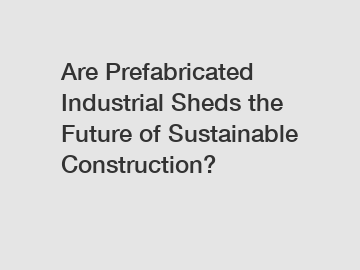Are Prefabricated Industrial Sheds the Future of Sustainable Construction?
Are Prefabricated Industrial Sheds the Future of Sustainable Construction?
In recent years, sustainable construction methods have gained immense popularity due to their ability to minimize environmental impact and maximize energy efficiency. With a growing emphasis on eco-friendly practices, developers and architects are constantly seeking innovative solutions to meet the demand for sustainable structures. One such solution gaining prominence is the use of prefabricated industrial sheds. These versatile and cost-effective structures are shaping the future of sustainable construction, revolutionizing the industry with their numerous benefits.
Prefabricated industrial sheds are constructed off-site in factories, where every component is precisely fabricated with minimal waste generation. This method ensures optimal efficiency, reducing construction time and costs significantly. By utilizing computer-aided design (CAD) and computer numerical control (CNC) technologies, these structures are manufactured with unmatched precision. The controlled environment of a factory eliminates the risk of weather-related delays and ensures higher quality control during the entire fabrication process.

One of the key features that make prefabricated industrial sheds an appealing option for sustainable construction is their energy efficiency. These structures can be designed to incorporate insulation systems, energy-efficient lighting, ventilation systems, and solar panels, among other sustainable elements. With careful planning and implementation, these sheds can achieve a high level of thermal performance, reducing the need for excessive energy consumption and decreasing the carbon footprint of the building.
Additionally, the versatile nature of prefabricated industrial sheds allows for easy customization and adaptability. Unlike traditional construction methods, these structures can be easily extended, modified, or relocated as per changing needs. This flexibility not only reduces the wastage associated with demolition or renovation but also allows for efficient land use. Companies no longer need to construct new facilities from scratch, as existing sheds can be repurposed or expanded to accommodate their growing requirements, thereby minimizing the need for additional construction materials.
The use of prefabricated industrial sheds in sustainable construction also offers substantial water savings. Water-efficient fixtures and plumbing systems can be incorporated during the manufacturing process, ensuring reduced consumption once the shed is operational. Additionally, rainwater harvesting systems can be integrated into the shed's design, further promoting sustainable water management. Collecting and utilizing rainwater for non-potable purposes such as irrigation or flushing toilets can significantly decrease the demand for freshwater resources, thereby conserving this valuable natural resource.
Another benefit of prefabricated industrial sheds is their potential for improved indoor air quality. By utilizing sustainable materials and implementing efficient ventilation systems, these structures can minimize the presence of harmful pollutants, allergens, and other contaminants indoors. This directly contributes to the health and well-being of workers or occupants, making it an attractive choice for those seeking sustainable solutions that prioritize human comfort.
Furthermore, the production of prefabricated industrial sheds involves minimal construction waste generation. In conventional construction, excessive materials end up in landfills, contributing to environmental degradation. However, with the prefabrication process, waste is significantly reduced as the fabrication takes place in a controlled factory environment. Any leftover materials are often recycled or repurposed, making prefabrication a sustainable alternative that leads to less overall waste production.
It is worth mentioning that the durability and lifespan of prefabricated industrial sheds are comparable to traditional construction methods, ensuring their long-term sustainability. These structures are designed and engineered to withstand various weather conditions, providing a stable and secure environment for industrial operations. With regular maintenance and periodic inspections, they can serve their intended purpose for decades, reducing the need for frequent reconstruction and minimizing the environmental impact associated with demolishing and rebuilding.
In conclusion, prefabricated industrial sheds are undeniably the future of sustainable construction. With their inherent energy efficiency, customization possibilities, water-saving characteristics, improved indoor air quality, and reduced construction waste, they tick all the boxes for environmentally conscious developers and architects. As the demand for eco-friendly structures continues to rise, embracing prefabricated industrial sheds is a step towards a greener and more sustainable future in the construction industry.
If you are looking for more details, kindly visit Modern Container Villa, expandable houses, expandable container house for sale.


